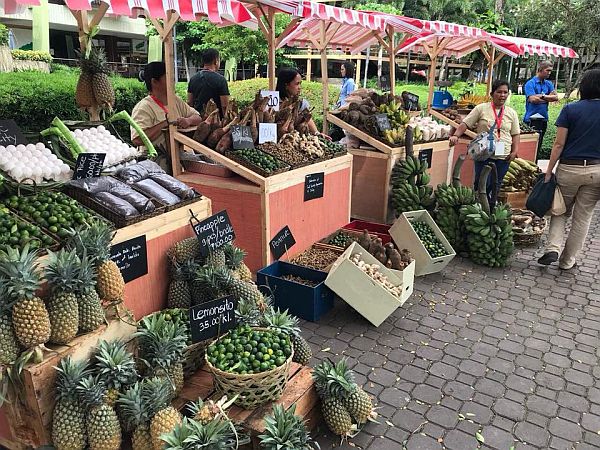
Cebu farmers are given a chance to showcase their produce at the Ayala Terraces in Ayala Center Cebu at the TienDA sa Ayala Malls, a result of a partnership with Ayala mall management and the Department of Agriculture.
AYALA CENTER MALL FB PHOTOS
REACHING out to THE YOUTH
The Department of Agriculture (DA) is banking on the youth’s social conscience as well as the power of social media to help propel the growth of agribusiness in the Philippines.
Bernadette Romulo-Puyat, DA undersecretary for agribusiness and marketing assistance service, said the country’s thriving agribusiness sector is currently driven by domestic demand.
“Take mangoes for example. We only export 10 percent of our mangoes because we consume 90 percent domestically. Our producers are saying we don’t really need to export anymore because there is a market here. People are now buying local,” she said during the launching of TienDA sa Ayala Malls in Cebu City last Saturday.
The DA, in partnership with Ayala Malls, rolled out the concept in Cebu where farmers and fishermen are given the chance to showcase their products through spaces and amenities provided free of charge.
Farmers and fishermen from all over the Visayas showcased their produce last Nov. 25 to 26 at The Terraces in Ayala Center Cebu.
According to Romulo-Puyat, the initiative seeks to provide farmers and fishermen a direct trading center which will eventually eliminate cartels, middlemen and dicers. This was first launched at the BPI compound in Manila last July 28.
Before Cebu, they also launched the fair at the Abreeza Mall in Davao City and eventually several other Ayala malls in Luzon before the end of the year.
Romulo-Puyat said they eventually plan to hold the agricultural trade fair across all Ayala malls in the country on a more regular basis as well.
The government official said the trade fair’s two-day run usually rakes in P1.5 million in revenues, which all go to the producers.
She attributed this demand in consumers’ growing appreciation for anything that is produced locally.
“More people are now buying local. But to be fair, the packaging and quality of locally-made products are also improving,” said Romulo-Puyat.
She added that she attributes the growth of agribusiness in the country to the young people whose growing social conscience compels them to patronize local products as a way to help poor farming and fishing communities.
Furthermore, she traces the growing demand for local agricultural products to the time the Philippines first hosted Madrid Fusion Manila (MFM), the first and only Asian edition of Madrid Fusion, which is considered the most important international gastronomy congress in the world.
Romulo-Puyat recalled that during the MFM in 2015, many international Michelin-star chefs visited the Philippines were blown away by locally-produced mangoes, kalamansi, dalandan and cacao, among others.
“Many of these international chefs loved our local produce, so why can’t we? After that, the domestic demand started to increase,” she said.
With health enthusiasts and social media influencers posting about locally-grown and produced agricultural products, the country’s agribusiness sector can expect a greater boost in marketing.
The DA’s optimism comes as the Philippine Statistics Authority (PSA) reported a recovery in the agriculture sector, which registered a high 5.28-percent growth rate in the first quarter of 2017 following several quarters of decline.
According to the PSA, all subsectors posted output increments with the crops subsector as the major growth driver during the period. At current prices, gross value of agricultural production amounted to P407.6 billion, which was 8.79 percent higher than the previous year’s record.